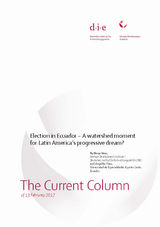The Current Column
Election in Ecuador: A watershed moment for Latin America’s progressive dream?
Heiss, Mona / Angelike PáezThe Current Column (2017)
Bonn: German Development Institute / Deutsches Institut für Entwicklungspolitik (DIE) (The Current Column of 13 February 2017)
Bonn, 13 February 2017. On Sunday 19 February, Ecuador will elect a new president. The decision will not only determine the course of politics in Ecuador, but will also indicate the future of Latin America’s progressive dream. In the past two decades, the region saw the rise of progressive governments with left-wing agendas. Now, there is a new order emerging and recent election results are challenging left-wing ideals. The election on Sunday will either bring this new order to Ecuador, or it will reveal a survival plan for Latin America’s progressivism. Progressive governments have heralded structural changes in Latin America. They remodelled constitutions, built inclusive education and welfare systems, and distributed the region’s recent commodity boom more equally. However, several countries have recently undergone a conservative rollback. Dilma Rousseff was expelled from office in Brazil in 2016, Cristina de Kirchner’s politics were voted out in Argentina in 2015, and in the same year, Nicolás Maduro lost a considerable part of his power in the National Assembly of Venezuela. Obviously, Latin America’s progressive governments have failed to eradicate the deep-seated corruption and nepotism that have plagued the region for so long. Which way for Ecuador? In Ecuador, current President Rafael Correa came into power with the multi-party movement “Alianza PAIS”. He has achieved considerable political and economic stability since he was elected in 2006. Now, at the end of his second turn, there is not much left of the inclusive political dialogue of the early years of his administration. On the down side, several of the government’s actions are worrying. In January, the government desisted from closing down the environmental NGO “Acción Ecológica”, a well-known opponent to the government’s environmental policies. In 2014 and 2016, delegations of the German Bundestag were refused permission to travel to the Amazonas, as the Ecuadorian government disapproved their request to talk to the opposition and civil society activists. In 2015, Correa was harshly criticised for an amendment to the constitution that allowed the president to be re-elected for an indefinite number of terms. Meanwhile, press freedom has worsened since the government started a public tender to assign TV and radio frequencies in 2013, threating the independency of editorial lines. It was, therefore, a big surprise when Correa announced he would not run in the upcoming election. Instead, he allocated the candidature for “Alianza PAIS” to his long-standing companion Lenín Moreno. Serving as Correa’s vice-president from 2007 to 2013, Moreno shaped Ecuador’s progressivism and gained an international reputation as “Special Envoy on Disability and Accessibility” to the United Nations in Geneva. Correa and “Alianza PAIS” seem to recognize the signals of the population’s frustration. They decided that Moreno, who is not associated with the government’s autocratic decisions, would be their most promising candidate. However, recent corruption scandals involving the state owned oil-company have damaged Moreno’s running mate, Jorge Glas, and threaten the stability of the ruling party. These scandals could put Moreno’s clean record and his candidacy at risk, favouring his opponent Guillermo Lasso, from the right wing political opposition. The latest polls indicate a tight race between Moreno and Lasso. Lasso and his “CREO” party are pushing for drastic changes to the political agenda. They insist on the urgency of new macroeconomic policies to counter the country’s deep recession, which is due to the plunge of oil prices. Lasso has promised to create one million jobs during his four year mandate, as well reduced taxes and state interventions to promote private and foreign investment. Lasso, however, has been linked to Ecuador’s 1998 economic crisis and his reputation was tainted by the scandalous Panama Papers. The political scene is highly uncertain, just a week out from election day. Either Moreno or Lasso could win in the first round, or if not a second round on 2 April will be decisive. Moreno’s victory would help “Alianza PAIS” to survive and allow Ecuador’s progressive dream to return to a non-autocratic path. Moreno should then use his new power to fight corruption and nepotism ‒ across Ecuador and his party. A new departure for Latin America? Moreno’s victory would be an encouraging signal to other progressive governments in Latin America. It would demonstrate that their time is not yet over ‒ if they respect public opinion and are open for internal reformation. Progressive governments drove democracy in Latin America, and they will only be re-elected if they follow democratic rules. They need to fight corruption and nepotism, above all in their own ranks. They need to regain their integrity. Their Recognition of this could be the key for Latin America’s progressive movements not only to stay in power, but also to keep the dream of a progressive future for Latin America alive. Mona Heiss is Participant of the 52nd Postgraduate Course at DIE. Angelike Páez is Lecturer in International Studies at University Espíritu Santo, Guayaquil, Ecuador

